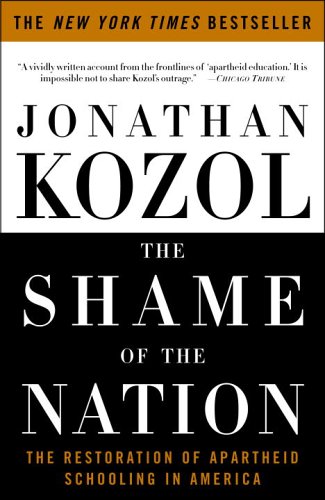
For an education class I'm taking, I just read Jonathan Kozol's The Shame of the Nation, and it was filled with some pretty interesting ideas on urban schools and the concept of resegregation. Yes, resegregation, not desegregation.
Kozol visited a bunch of schools (perhaps not enough surburban or rural schools) to examine the problems existing within them. His focus is really to determine the inequalities of schools and educations for minority children, especially African American and Hispanic children in inner city schools. Kozol focuses mostly on elementary schools, but looking at middle and high schools might have made his book a little more rich in substance.
Kozol definitely seemed to be trying to expose "the shame of the nation" by dramatizing certain points and by playing on our emotions through telling stories of certain students. All information that he included obviously proved his point, but is he a bit extreme with being one sided and biased? I guess if he's trying to prove a certain point, then he is not.
I felt pretty hopeless when I was reading it. He'd show a glimmer of hope and light in education, and then he would shatter it with some detail or fact. I see how this is how it is, and his point is to show the failures and struggles in trying to make education equal, but it was pretty gloomy for a while. Towards the end of the book, Kozol finally offers some sort of advice and help, showing slight glimmers that offer some sense of direction to head.
His main points for how to end this resegregation and this state of unequal educations are the following. He thinks that schools should have much more integration, so schools should bus students to mix them together. Funding is big. Schools with more money perform better (as he argues). There needs to be a revolution to make big changes, just like there was one during the Civil Rights Movement, but there was no follow through. Nothing really happened with segregation. If anything, he says, things are probably worse than then. And, he believes that single teachers can try to make the effort to instill the best education they can for their students. Some teachers are burned out, but some of them really do care and put in the extra effort to make up for what the schools are lacking.
Here are some quotations from the book that I found kind of interesting:
"Not the place but the path, not the goal but the way."
"Numbers do not tell us all we need to know about our children."
"Over two thirds of Americans believe 'desegregation improves education for blacks,' and 'a growing population is convinced' it has a positive effect for whites as well. In surveys among young adults, 60% believe the federal government ought to make sure that public schools are integrated, while the same percentage of black respondents do not merely favor integrated education but believe it is 'absolutely essential' the the population in the school be racially diverse. (Only 8% of blacks and only 20% of whites say that this is not of much importance.)"
"Some of the children seemed to have accepted these conditions or, at least, did not appear to feel they had the right to question them."
"What saddens me the most during these times is simply that these children have no knowledge of the other world in which I've lived most of my life and that the children in that other world have not the slightest notion as to who these children are and will not likely ever know them later on, not at least on anything like equal terms, unless a couple of these kids get into college."
"I also think we need to recognize that our acceptance of a dual education system will have consequences that may be no less destructive than those we have seen in the past century."
"The desegregation of black students, which increased continuously from the 1950s to the late 1980s, has now receded to levels not seen in three decades... During the 1990s, the proportion of black students in majority white schools has decreased... to a lower level than in any year since 1968... Almost three fourths of black and Latino students attend schools that are predominantly minority, and more than two million, including more than a quarter of black students in the Northeast and Midwest, 'attend schools which we call apartheid schools' in which 99 to 100 percent of students are nonwhite."
"There will be no renaissance without revolution."
It's not a terrible read. I could see how some people could have a backlash or would react negatively to what he has to say, but he presents some interesting information to ponder about. It's not a dense read anyway. It's written at a pretty easy level to undertand. Not the worst read in the world by any means.
So, what do you think of Jonathan Kozol's The Shame of the Nation?


1 comment:
Profile of michigan employment, including job statistics and information about related colleges and trade schools. Start your search for state of michigan jobs with snagajob. Dip the french loaf into the gravy and eat with it. Explore 1,000 jobs in canton, mi all canton, mi jobs updated daily. Cmm programmer operator technician job in grand rapids, michigan, us. percent, the lowest in three years.
Post a Comment